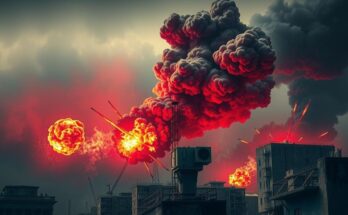An Emirati diplomat met with Iran’s foreign minister to discuss a letter from U.S. President Trump, aiming to initiate dialogue on Iran’s nuclear program amid ongoing economic hardships and geopolitical tensions. Trump has emphasized that Iran must not acquire nuclear weapons, raising the stakes for potential military actions as Iran’s uranium enrichment approaches weapons-grade levels.
An Emirati diplomat, Anwar Gargash, was identified as delivering a letter from U.S. President Donald Trump to Iranian Foreign Minister Abbas Araghchi. This meeting occurred amidst ongoing tensions regarding Iran’s nuclear program and the regional security situation. Although the details of the letter remain undisclosed, Trump previously indicated it was an attempt to initiate discussions with Iran, which has resisted talks with the U.S. Government.
Iran continues to grapple with severe economic challenges intensified by U.S. sanctions. These measures have contributed to a precarious state for Tehran, compounded by internal discord and military confrontations, notably from Israel. The geopolitical landscape has changed dramatically since the 1979 Islamic Revolution, placing further pressure on Iran’s ruling theocracy.
During Gargash’s unexpected visit to Tehran, Iranian state television highlighted his meeting with Araghchi, but footage did not reveal the contents of the letter. The UAE has vested interests in maintaining strong ties with the U.S., and Gargash’s trip coincides with the holy month of Ramadan. Trump’s outreach to Iran echoes his previous attempts with North Korea, although outcomes from such initiatives have remained limited and ineffective.
Trump has accentuated that Iran must not be allowed to acquire nuclear weapons, and both Israel and the U.S. have reiterated their positions against Iran’s nuclear advancements. Recent reports indicate Iran’s uranium enrichment is nearing weapons-grade levels, raising concerns over potential military action from the U.S. or Israel.
Historical events illustrate the troubled relations between the U.S. and Iran, notably Trump’s withdrawal from the nuclear deal in 2018, which precipitated extensive sanctions. Iran’s subsequent retaliatory actions, coupled with enduring economic turmoil and civil unrest, complicate prospects for a resolution. Furthermore, geopolitical dynamics have intensified with ongoing hostilities involving Israel, raising stakes for both regional and global security.
In summary, the diplomatic engagement between the Emirati diplomat and Iranian officials reflects an ongoing attempt to navigate intricate regional tensions surrounding Iran’s nuclear ambitions. How Iran responds to this overture from Trump will be critical for future negotiations and geopolitical stability in the region, as economic pressures and internal dissent continue to mount.
In conclusion, the Emirati diplomat’s meeting with Iran’s foreign minister marks a notable effort to address escalating tensions surrounding Iran’s nuclear program. Despite Trump’s outreach, Iran’s response remains uncertain amid economic difficulties caused by U.S. sanctions. As both the U.S. and Israel maintain firm stances against Iran’s nuclear ambitions, the situation poses significant implications for regional security and diplomatic relations moving forward.
Original Source: www.stripes.com




